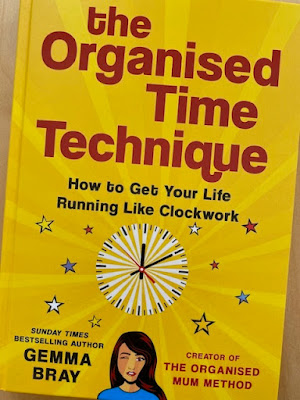I received a copy of this book in exchange for a review. This post contains Amazon affiliate links.
Last year I turned around my cleaning routine thanks to The Organised Mum Method by Gemma Bray. The book really spoke to me, and helped me to make sense of the way that I could organise my housework to make sure that everything was done on a regular basis. I'm still following the method and it has really helped me to feel in control. So I was very interested to find out that Gemma has written a new book - The Organised Time Technique (affiliate link).
Here's the blurb:
Do you ever get to the end of the day and feel like you've achieved nothing? Do you find it difficult to decide how to spend the small amount of free time you have? Do you ever wonder how some people seem to be able to do more with their time than others?
The Organised Time Technique is Gemma Bray's unique method for organising the day that will stop us from trying to do everything (and feeling like a failure when we can't), keep us focused on how we use the time we have available, help us to play to our strengths and, most importantly, stop worrying about what anyone else is doing.
The premise of the book is to really be aware of the fact that time is finite and that can, and will, run out. You are encouraged to break down your day into small blocks of time, for example 30 minutes, which gives you 48 units to divide between three levels of daily tasks. Level one tasks are absolutely essential - like sleeping and eating. Level two tasks would cause major disruption if you didn't do them - for example going to work, the school run and cleaning. Level three tasks are your focus tasks - the things that you really want to do, like your hobbies.
The first and most important step is to carry out a time bootcamp. Keep an honest record over the week of where your time is really going. This will help you to understand what sort of a timekeeper you are and how you can work with this to make some changes. It will help you to identify your typical time suckers, for example scrolling through social media, and where you are spending more time than you need to on a task. Then you can carry out an audit. You will work out firstly which tasks you can drop completely, and secondly how you can manage the remaining tasks so that they take up less time, for example by grocery shopping less frequently.
Although the techniques in the book can be used by all, it is written with particular relevance to mums, and especially working mums. It might seem sexist, but the reality is that many mums are juggling childcare and housework, as well as work, and are also involved in several other commitments like the PTA at school. The book is written in a really friendly and realistic way, and so it's very easy to relate to how you can use the techniques to turn things around.
I was reassured to be reminded that it is often difficult for mums to take pleasure in things that take them away from their parental duties, and that this is perfectly normal. The book has some really good tips on the importance of self-care and looking after yourself so that you are in a position to help others. You shouldn't feel guilty that you are taking time out for yourself, and you only need to be accountable to yourself. And spending just thirty minutes a day working towards a larger goal can yield really big results.
I found this book really accessible, and although a lot of the advice is common sense, having it all written down in an easy to understand way makes it easy to digest and to think about the changes that you can make. I found it really motivational, and I've already made some changes to my life. For example I already know that I spend far too much time scrolling on my phone, so I've been making a conscious effort to keep it at a distance and pick up a book instead.
The book was written during the Covid-19 pandemic, and so it's completely up to date with all the new challenges that families have been and still are facing. It arrived at a good time for me, as I begin to pick up things where I left them back in March and as we all get used to a new normal where some things are the same but others completely different. Now that I've given the book a good read through and taken the information on board I'm definitely going to be making some changes to how I manage my time.
If you want to understand where your time goes and how you can organise yourself to make the absolute most of it I'd definitely recommend this book!













